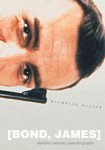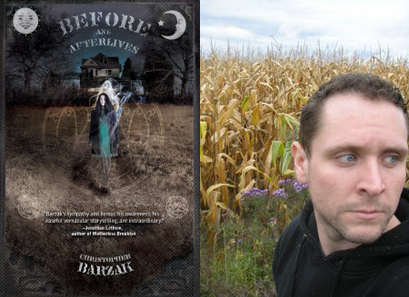I’d never read anything from Ahsahta Press before, but fate sent me a copy of Janaka Stucky’s The World Will Deny It For You, winner of the first Ahsahta Press Chapbook Award judged by Cathy Wagner, and now I know to lookout for their future titles. I’ve also now learned that Janaka Stucky is, beyond being the badass conductor of poetic mayhem behind Black Ocean, a damn fine poet himself, creating in The World Will Deny It For You a tightly wound collection of poems that use minimalistic style to create wide-open moments of great weight. And Stucky too, like all wonderful writers I meet, is willing to be interrogated about this new book, and kindly indulged us here.
MB: Talk to us a little about the final lead-up to your Ahsahta Press contest submission – how long was this manuscript in the drafting stages and what final editorial work did you do before submitting?
JS: Well, I’m a little abashed to say that the manuscript as a whole was assembled in a matter of days. I don’t usually submit to contests with reading fees, and in fact this was the first one I did submit to in about 8 years. I found out about the contest at the last minute and although I didn’t know Cathy Wagner personally, I knew her work—and thought she might like mine. So the manuscript was assembled somewhat frantically over a 72-hour period while I was visiting with the poet, Adrianne Mathiowetz, in Minneapolis. She really helped give an objective eye toward decisions on inclusion, and helped me organize the work. Even an editor needs an editor, and I don’t know if I would have pulled this manuscript off without her help.
 MB: Once The World Will Deny It For You was announced as the winner, was there still the usual editorial process with the press editors? How different is the published version from the original manuscript you submitted?
MB: Once The World Will Deny It For You was announced as the winner, was there still the usual editorial process with the press editors? How different is the published version from the original manuscript you submitted?
JS: I’d say the versions are very similar. Janet Holmes, who is the lifeblood of Ahsahta, assembled some editorial suggestions—a sort of aggregate of ideas from herself, Cathy Wagner, and other editorial staff members. I pushed back on a few but also saw the wisdom in them. Ultimately, the difference is: a few line edits, one poem cut, and one poem moved to a different spot in the book.
MB: One of the key components of The World Will Deny It For You seems to be the building of contrast between light and dark, for example:
from ‘You Are Invisible. Go Visible.’:
Inside the mouth of the flower remains / The second eyelid / True darkness / Alien light / Resurrecting us
or the poem that follows it:
from ‘The Heart Will Be Destroyed to Give Place to the Light Which It Might Have Contained’:
Nothing cannot pass / Through me the mask / I wear is a pyramid of fire / Fierce geometry of light / A cloud and its shadow / The hesitation of a lightning bolt
Where does the sharp contrast between these two elements come from in your writing process, and what does it mean in your poetry (assuming that it carries some sort of philosophical weight)?
JS: Well, I should begin by saying that I wasn’t even really aware of that theme until you mentioned it—but now it’s so obvious to me! So I can’t claim a conscious philosophical weight, but I know where it comes from now that I’m aware of it… First, I think it comes from the psychological place this manuscript was written in. It’s sort of a sequel to my 2009 chapbook, Your Name Is the Only Freedom, which was a very dark book that was written in a very dark period of my life. This new book is about recovering from that—not an annihilation of darkness, but a creation of light within that darkness, and the cohabitation of the two. Also, interestingly, I think this contrast comes from my writing process itself—which involves a kind of somatic ritual to induce the trance state in which these poems occur. I write at night, with all the lights off in the house except for two votive candles providing just enough light to see what I’m writing. There are other elements to the ritual, but perhaps this one particularly informs the contrast you mentioned.
MB: It seems that all poets are chasing someone or something in their poetry. In The World Will Deny It For You, you open with:
from ‘Everyone Thinks I’m Ancient But I’m Only Seven’:
My maps are useless and invisible; now and then a tentacle / reaches up from the darkness and points to the places you are not. I / remember everything about you but when I awake there is only your hair / in my fists and the journey ahead. When my small boat finally arrives, the / angel in your place will say that I am too late—you are long gone.
Who or what is your poetry chasing in The World Will Deny It For You?
JS: Most of these poems are a direct address to “you,” so I might say that these poems are chasing the Other. For the most part that’s true, but more than chasing the Other they’re about learning to love the Other despite constant imminent loss. The truth is, we will lose everyone we love—there are no exceptions. There is a kind of perfection to that absolute loss that is very painful to grasp, but once it’s embraced it’s entirely liberating. That’s what this book is documenting; the pursuit of that perfect state of acceptance.
MB: As always with editors / publishers who are also writers, I wonder about the effect that publishing has on their work. How does your role at Black Ocean affect your writing? Does the style of another poet ever infect you? Do the editorial skills you’ve acquired immediately translate to better editing of your own work?
JS: Sadly, the brilliance of the writers I publish doesn’t seem to infect me. It does inspire me though, by showing me what’s possible. I like to publish books I wish I had written, in one way or another. I definitely think being a poet makes me a better editor, and so I suppose the same is true vice versa. It gives me perspective and empathy, and those are always good qualities to have.
MB: And now that The World Will Deny It For You is out in the world, what are you working on, what is the next project in your queue?
 JS: I have several projects in queue. I’m collaborating with the artist who did the cover of one of our new books, Butcher’s Tree, on a comic that’s semi-autobiographical about my seven years working as an undertaker. I’ve also got a full-length book of poems that’s getting close to completion… I’m taking my exploration of writing from trance states further while I attempt a long poem called The Saint Children. I have other wish list projects, but I’m trying to wait until these are complete before I begin them. In the meantime, I just came off a reading tour for The World Will Deny It For You, but I plan on more appearances around the country before the end of the year.
JS: I have several projects in queue. I’m collaborating with the artist who did the cover of one of our new books, Butcher’s Tree, on a comic that’s semi-autobiographical about my seven years working as an undertaker. I’ve also got a full-length book of poems that’s getting close to completion… I’m taking my exploration of writing from trance states further while I attempt a long poem called The Saint Children. I have other wish list projects, but I’m trying to wait until these are complete before I begin them. In the meantime, I just came off a reading tour for The World Will Deny It For You, but I plan on more appearances around the country before the end of the year.
I much prefer the concrete world over philosophy – but Janaka Stucky manages to mesh philosophical moments with tangible landscapes in The World Will Deny It For You, creating an engrossing and profound poetry collection that has the weight of philosophy yet is entirely (and lustfully) readable. Pick up a copy of The World Will Deny It For You here, & read more from / about Janaka Stucky here.



